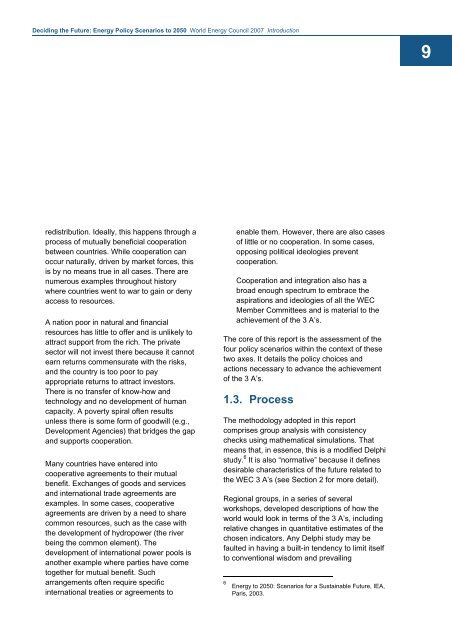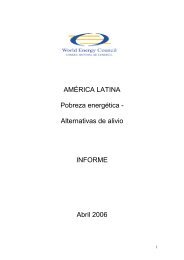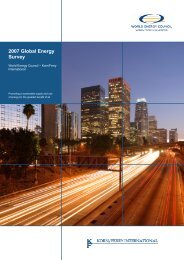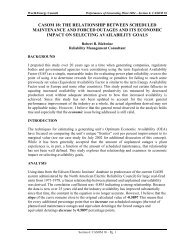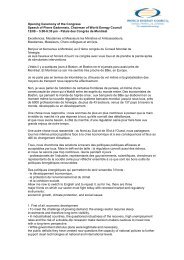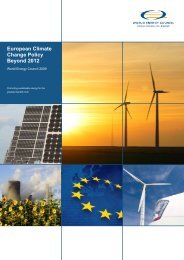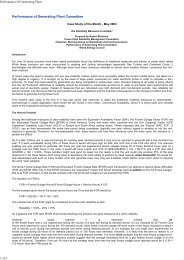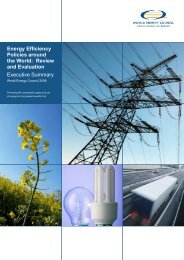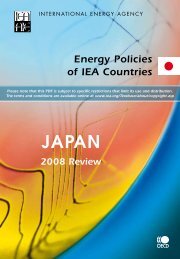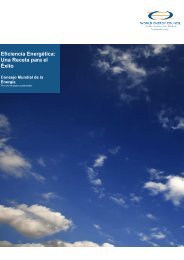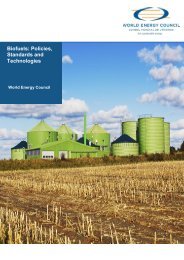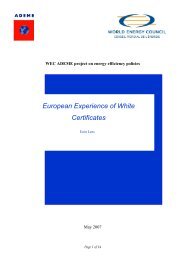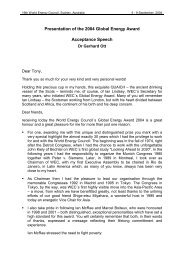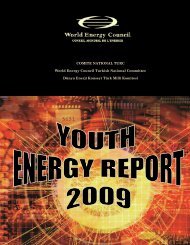Deciding the Future: Energy Policy Scenarios to 2050
Deciding the Future: Energy Policy Scenarios to 2050
Deciding the Future: Energy Policy Scenarios to 2050
You also want an ePaper? Increase the reach of your titles
YUMPU automatically turns print PDFs into web optimized ePapers that Google loves.
<strong>Deciding</strong> <strong>the</strong> <strong>Future</strong>: <strong>Energy</strong> <strong>Policy</strong> <strong>Scenarios</strong> <strong>to</strong> <strong>2050</strong> World <strong>Energy</strong> Council 2007 Introduction<br />
9<br />
redistribution. Ideally, this happens through a<br />
process of mutually beneficial cooperation<br />
between countries. While cooperation can<br />
occur naturally, driven by market forces, this<br />
is by no means true in all cases. There are<br />
numerous examples throughout his<strong>to</strong>ry<br />
where countries went <strong>to</strong> war <strong>to</strong> gain or deny<br />
access <strong>to</strong> resources.<br />
A nation poor in natural and financial<br />
resources has little <strong>to</strong> offer and is unlikely <strong>to</strong><br />
attract support from <strong>the</strong> rich. The private<br />
sec<strong>to</strong>r will not invest <strong>the</strong>re because it cannot<br />
earn returns commensurate with <strong>the</strong> risks,<br />
and <strong>the</strong> country is <strong>to</strong>o poor <strong>to</strong> pay<br />
appropriate returns <strong>to</strong> attract inves<strong>to</strong>rs.<br />
There is no transfer of know-how and<br />
technology and no development of human<br />
capacity. A poverty spiral often results<br />
unless <strong>the</strong>re is some form of goodwill (e.g.,<br />
Development Agencies) that bridges <strong>the</strong> gap<br />
and supports cooperation.<br />
Many countries have entered in<strong>to</strong><br />
cooperative agreements <strong>to</strong> <strong>the</strong>ir mutual<br />
benefit. Exchanges of goods and services<br />
and international trade agreements are<br />
examples. In some cases, cooperative<br />
agreements are driven by a need <strong>to</strong> share<br />
common resources, such as <strong>the</strong> case with<br />
<strong>the</strong> development of hydropower (<strong>the</strong> river<br />
being <strong>the</strong> common element). The<br />
development of international power pools is<br />
ano<strong>the</strong>r example where parties have come<br />
<strong>to</strong>ge<strong>the</strong>r for mutual benefit. Such<br />
arrangements often require specific<br />
international treaties or agreements <strong>to</strong><br />
enable <strong>the</strong>m. However, <strong>the</strong>re are also cases<br />
of little or no cooperation. In some cases,<br />
opposing political ideologies prevent<br />
cooperation.<br />
Cooperation and integration also has a<br />
broad enough spectrum <strong>to</strong> embrace <strong>the</strong><br />
aspirations and ideologies of all <strong>the</strong> WEC<br />
Member Committees and is material <strong>to</strong> <strong>the</strong><br />
achievement of <strong>the</strong> 3 A’s.<br />
The core of this report is <strong>the</strong> assessment of <strong>the</strong><br />
four policy scenarios within <strong>the</strong> context of <strong>the</strong>se<br />
two axes. It details <strong>the</strong> policy choices and<br />
actions necessary <strong>to</strong> advance <strong>the</strong> achievement<br />
of <strong>the</strong> 3 A’s.<br />
1.3. Process<br />
The methodology adopted in this report<br />
comprises group analysis with consistency<br />
checks using ma<strong>the</strong>matical simulations. That<br />
means that, in essence, this is a modified Delphi<br />
study. 6 It is also “normative” because it defines<br />
desirable characteristics of <strong>the</strong> future related <strong>to</strong><br />
<strong>the</strong> WEC 3 A’s (see Section 2 for more detail).<br />
Regional groups, in a series of several<br />
workshops, developed descriptions of how <strong>the</strong><br />
world would look in terms of <strong>the</strong> 3 A’s, including<br />
relative changes in quantitative estimates of <strong>the</strong><br />
chosen indica<strong>to</strong>rs. Any Delphi study may be<br />
faulted in having a built-in tendency <strong>to</strong> limit itself<br />
<strong>to</strong> conventional wisdom and prevailing<br />
6<br />
<strong>Energy</strong> <strong>to</strong> <strong>2050</strong>: <strong>Scenarios</strong> for a Sustainable <strong>Future</strong>, IEA,<br />
Paris, 2003.


